Political reporter
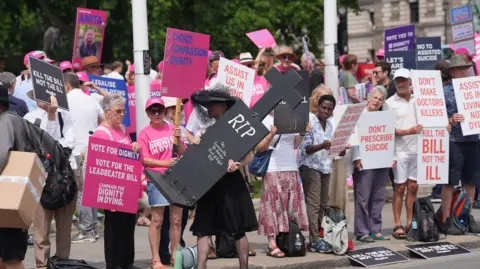 PA Media
PA MediaIn an historic vote, MPs have approved a bill which gives terminally ill adults in England and Wales the right to end their own lives.
The Terminally Ill Adults Bill, which was backed by 314 votes to 291, will now go to the House of Lords for further scrutiny.
The vote came after an emotionally-charged debate which saw MPs recount personal stories of seeing friends and relatives die.
The bill was proposed by Labour MP Kim Leadbeater who used her opening speech to warn MPs that: “Either we vote for the safe effective workable reform contained in this bill or we say the status quo is acceptable.”
She recounted stories from terminally ill people and their families including a man called Warwick whose wife Ann “begged him to put an end to her suffering – but he didn’t want the last memory she had of him to be stood over her with a pillow”.
The last time MPs debated a bill to introduce assisted dying was in 2015 and Leadbeater said it “fills me with despair to think MPs could be here in another 10 years time hearing the same stories”.
She added: “If we don’t vote to change the law today what does that mean? It means we will have many more years of heart-breaking stories from terminally ill people and their families, of pain and trauma, suicide attempts, PTSD, lonely trips to Switzerland, police investigations and everything else we have all heard over recent months.”
Speaking against the bill, Conservative MP James Cleverly said he was struck by the number of medical professional bodies who were neutral on the principle of assisted dying but were opposed to the specific measures in the bill.
“When the people upon whom we rely to deliver this say we are not ready… we should listen,” he said.
He also disagreed with Leadbeater that it was a “now or never moment” arguing that there would be “plenty of opportunities” to return to the subject in the future.
Labour’s Diane Abbott – the longest serving female MP in the House of Commons – said there was “no doubt that if this bill is passed in its current form, people will lose their lives who do not need to, and they will be amongst the most vulnerable and marginalised in our society”.
Another Labour MP Peter Prinsley recounted his experience as a doctor and said he believed the bill would give terminally ill people “final peace of mind”.
“There is an absolute sanctity of human life, but we are not dealing with life or death – we are dealing with death or death.
“For there is also a sanctity of human dignity and fundamental to that is surely choice – who we to deny that to the dying?”
At the start of the day, MPs voted on a series of amendments that had been debated last week.
These included a measure to close the so-called “anorexia loophole” which would stop people qualifying for assisted dying on the basis of life-threatening malnutrition.
MPs backed that amendment as well as one requiring the government to publish a review of palliative care services within a year of the bill passing.
Attempts to block access to assisted dying for people suffering mental health problems or because they feel “burdensome” was defeated by a majority of 53.
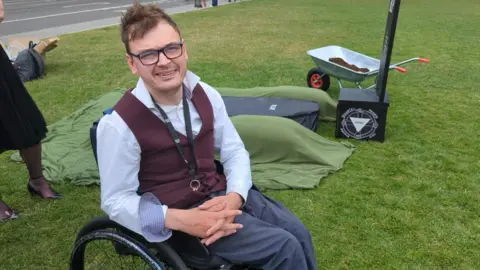
Campaigners from all sides were out in force as MPs started their debate, with many disabled and bereaved people wanting to have their voices heard.
George Fielding from Not Dead Yet said the bill is reckless and he believes it will “endanger, foreshorten and I would say kill the most vulnerable people in our society”.
As someone with cerebral palsy, he believes the bill is “ableist” and many of those who end their own lives when they become disabled are experiencing “unprocessed hurt and trauma”.
Sitting by a mock graveside in his wheelchair, George said: “We are giving people assistance to die before we give them assistance to live.”
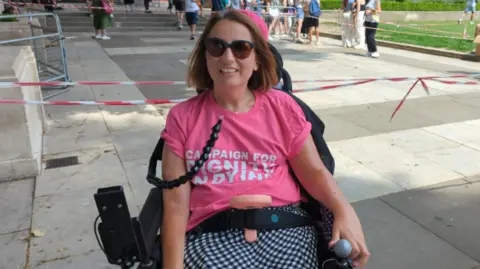
Mother-of-two Emma Bray has Motor Neurone Disease, which has progressed to the point she has now decided to end her own life.
She says she has no quality of life, and it’s been terrible for her children to watch their mum in so much pain and losing all the joy she’s had in her life.
Emma is unable to take pills unaided or travel to a different country, which would also be “a massive financial burden” to her family, so she has no better option.
She will stop eating and drinking next month to bring her life to an end, with her friends and family around her.
Emma says a change in the law will make no difference to her, but she is campaigning so others don’t have to go through the same pain and suffering.
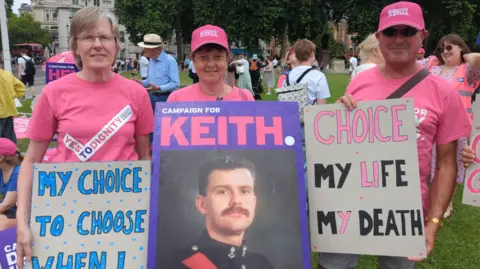
The family of Keith Fenton were standing with a placard of the former Squadron Sergeant Major in his Royal Engineers regalia.
His widow Sara explained she had told him she didn’t want him to go to a clinic in Switzerland when he became very ill with Huntingdon’s Disease, which he had already watched his father, sister and two brothers die of.
“He was becoming locked in his own body and unable to look after himself and, as a former soldier, he was a very proud man and found it hard to ask people to do things for him,” she said.
“It was only when he tried and failed to commit suicide that I realised I was being selfish saying he couldn’t go to Dignitas.”
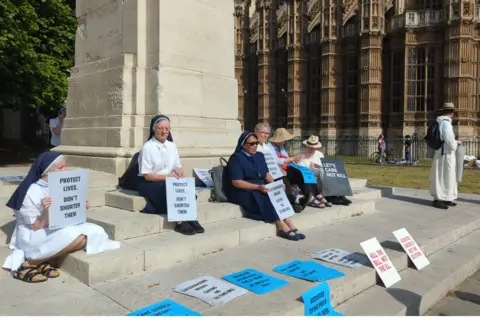
However, a group of nuns from the Sisters of Nazareth Mission holding a vigil against the bill urged MPs to prioritise palliative care and make better pain relief available to more people.
Sitting outside Westminster Abbey in quiet protest, Sister Doreen Cunningham held a sign reading “Let’s care not kill”.
She said: “How can you say whether someone is going to die within six months when doctors themselves find it hard?”


